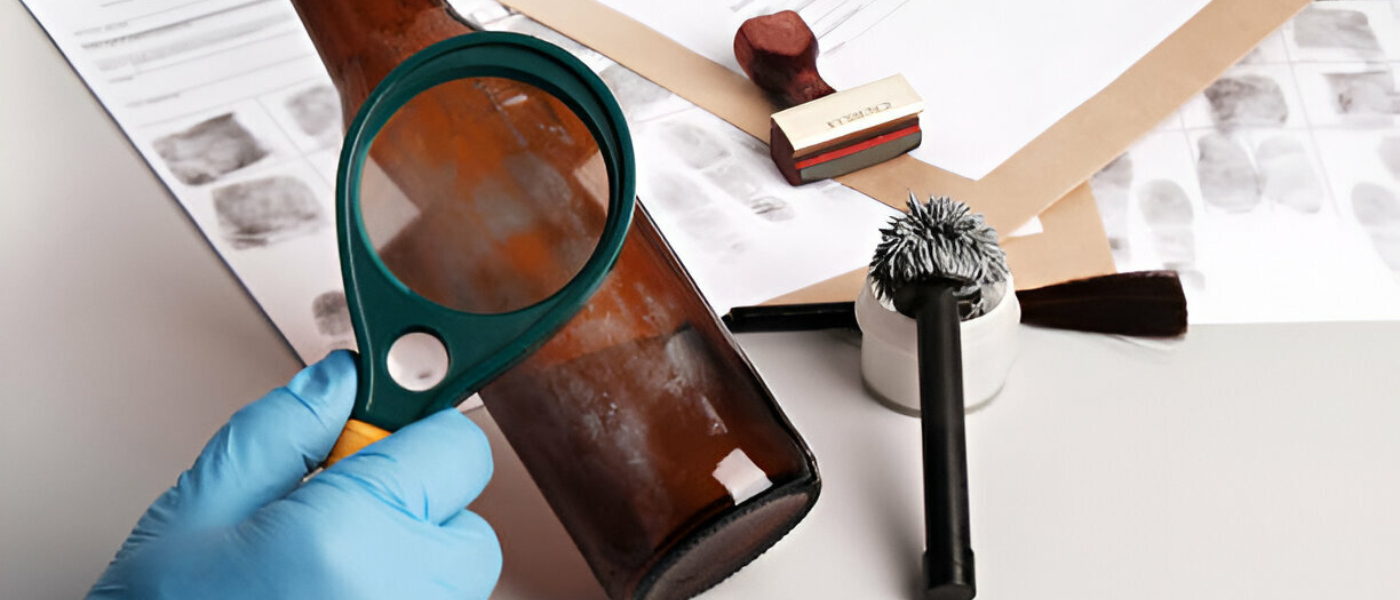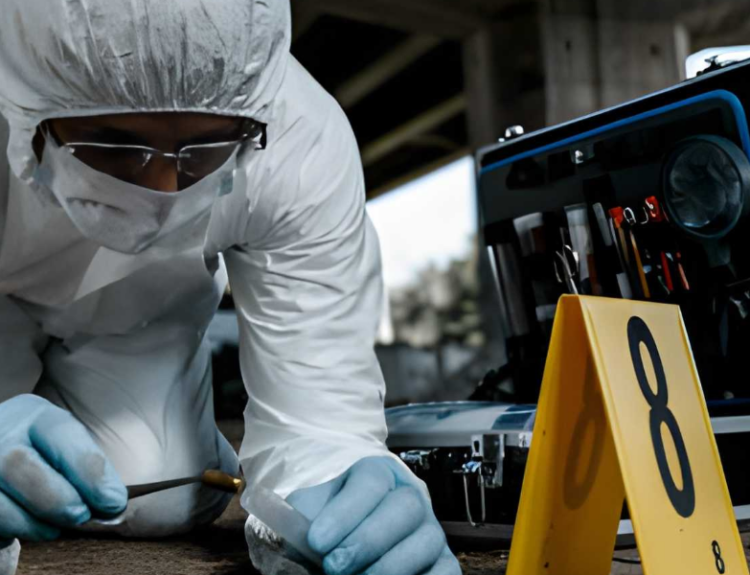Forensic science, sometimes called Criminalistics, applies scientific knowledge and know-how to crime investigation, detection, and decision-making. The purpose of forensic science is to provide solid proof and understanding of the crime, to judge fairly in criminal matters, and to assist civil law.
However, these investigations and deep dives are done by experts who are formally educated in the field. Usually, someone with a forensic science degree and someone who knows how to use applied science to assist a criminal investigation.
So, that’s what we’re here for today as we analyze the top forensic degree universities around the USA. Besides that, we’ll also look into the best forensic degree courses offered by such universities. So, let’s dive right into it.
What is Forensic Science?
Forensic Science is the study of crime and acts of crime using applied sciences. The purpose of using science in this matter is to figure out the science behind the crime and to adjudge and pinpoint accurate decisions regarding criminal accusations.
The basics of forensic studies are to use critical proofs of a crime, such as DNA, Fingerprints, Bloodstains, and other sort of data. The purpose of this practice is to:
- Identify and analyze physical evidence and find proof of a crime accurately;
- Support criminal investigations via scientific expertise and methods;
- Provide reliable and undeniable evidence of crime for legal proceedings;
- Determine the cause, time, and other circumstances of death;
- Reconstruct the crime scene to pronounce the occurrence better;
- And link suspects to the crime through analytical evidence and examination.
That’s why forensic degree programs are made to create experts in the field. And all of them need to go through rigorous theoretical and practical training. This is usually provided through degrees that focus on key areas of the subject.
Therefore, anyone looking to pursue this as a career should and must look for a renowned university with accredited programs. Besides, they should also pursue additional certificates and diplomas to improve their prowess in the field.
Related: The Impact of Advance Technologies on Criminal Investigations
What is a Forensic Science Degree?
A forensic science degree is a bachelor’s or master’s degree program offered by universities. This degree provides knowledge and skills regarding the analysis of a crime scene, the science and motivation behind a crime, and the analysis of evidence at hand.
It’s done through a variety of courses that help the student understand the science of processing evidence. That’s why it has a blend of subjects, such as:
- Biology
- Chemistry
- Physics
- Law
That’s why it’s considered a sum of various fields and is usually ideal for those with a knack for science or those who wish to pursue detective and police work. These degrees also teach the process of toxicology and DNA analysis.
Besides, students also thoroughly get to understand how to pursue careers in crime laboratories, as it focuses on:
- Writing reports and interpreting evidence;
- Testifying in court or formally presenting evidence;
- Interpret information in documents;
- And perform various tests, i.e., DNA, fingerprints, etc.
These are taught through various courses and classes. These classes are usually a blend of theory and practice, and each one focuses on an essential area of the subject. That’s why most forensic science major colleges focus on formulating thorough curriculums for this degree.
Types of Forensic Science Degree Majors
Let’s talk about a few main types of forensic science degree majors and what you learn in each one.
1: Forensic Psychology Degree
A Forensic Psychology degree focuses on understanding psychology under the light of the legal system. This helps them understand criminal conduct and gives them an edge in understanding criminal minds while allowing them to focus on:
- Psychological assessment of perpetrators;
- Recreate crime scenes from a criminal point of view;
- And understand and scrutinize criminal behavior.
That’s why students with this degree are usually found working in correctional facilities, rehabilitation, or crime investigation units.
2: Computer Forensic Degree
A degree in computer Forensics focuses on the use of digital devices in criminal investigations. This means using computers to analyze, recover, and preserve digital evidence from computer devices. For example, examining a perpetrator’s phone and computers. So, the students learn to:
- Investigate cybercrime;
- Recover deleted data;
- Analyze digital footprints;
- And analyze any digital devices used in a crime.
These graduates usually find work in the cybersecurity sector, as well as law enforcement agencies, and assist with criminal investigations.
3: Forensic Accounting Degree
Forensic Accounting degree is the study of analyzing fraudulent activities related to finance. The focus of this degree is to identify unusual patterns in finances. And that’s why this includes subjects such as:
- Accounting
- Auditing
- Investigative
- Finance Law
And so, this degree holder would usually be tasked with understanding corporate compliance and detecting discrepancies in finances and accounts. Besides, they also audit and examine financial records to support legal cases with financial evidence.
4: Cyber Forensic Degree
Cyber Forensic degrees also focus on computers and provide tools and skills to investigate cybercrime. While they focus primarily on cybercrime, these degree holders are usually assistants to investigations in crimes that employ technology. So, the subjects they typically focus on include:
- Use of tech in crime;
- Hacking and data breaching;
- Online frauds;
- Identity threats and doxing;
- And locating/fishing out offenders online.
These experts usually help build cases against cyber criminals and also assist with revealing the original identity of the perpetrators. That’s why this is ideal for those with a knack for computers.
5: Forensic Pathologist Degree
Forensic Pathologists are experts at determining the cause of death, the time, and the occurrence/happenings surrounding the death. They aren’t morticians or doctors who perform post-mortems.
However, they do examine autopsy results and other information. That’s why their areas of study include:
- Pathology
- Toxicology
- Legal medicine
And that’s why these degree holders end up working as medical examiners, crime scene investigators (pathology-related only), and coroners.
6: Forensic Anthropology Degree
Forensic Anthropology is another field of study that helps with deep investigations of homicides and other criminal acts. The study focuses on the examination of human skeletal remains and assists in investigations. So, they focus on:
- Understanding the age, sex, and ancestry of the skeleton;
- Understand the trauma or injuries suffered by the skeleton and determine the cause of death;
- And analyze DNA or other data to identify the victim.
That’s why they work in academic settings, law enforcement, and various types of investigation.
Related reading: An Online Guide to Forensic Nursing Degree Programs in the USA
What Forensic Science Courses Are Offered in a Bachelor’s Program?
The courses in a forensic science degree, online or on-campus, depend on the university or college offering the degree. However, there are some paramount courses that will be found in almost all of the forensic science degrees.
For example, introduction to Forensic Science is one of the most common courses that you’ll find in a degree like this. Besides, toxicology, DNA analysis, and fingerprint attainment courses are also quite common.
Other than that, some courses overlap with other degrees as well. For instance, you will almost always find Criminalistics and Crime Scene Investigation courses in any forensic science curriculum.
But, an excellent way to find out what courses/subjects are being offered is by looking for the forensic degree requirements and curriculum on university websites. However, some of the most common courses found in a forensic science degree include:
- Forensic Biology
- Forensic Geoscience
- DNA Analysis
- Chemistry
- Toxicology
- Forensic Photography
- Biological Evidence
- Environmental Forensics
- Genetics
There are plenty more courses, such as Digital Forensics, but courses like those are found in specific degrees, such as Cyber or Computer Forensic degrees. So, it comes down to degree titles and specialization as well. For instance, an Anthropology degree might comprise of courses like:
- Medical Anthropology
- Osteology
- Mortuary Archaeology
- Comparative Anatomy
Whereas a digital forensic degree like Computer Forensics or Cyber Forensics will comprise courses like:
- Ethical Hacking
- Networking and Network Security
It all boils down to the degree of specialization and the field of forensics that you choose to pursue. As mentioned in the previous section, each degree assists with the investigation of different types.
Therefore, it’s crucial to pick a degree that not only offers the right course for this field but also aligns with your career goals.
Criminology vs Forensic Science Degree: What’s the Difference
A criminology degree is focused on the study of crime. On the other hand, a forensic science degree focuses on the science of crime. A criminology degree emphasizes criminal behavior and the science behind criminal behavior.
On the other hand, a forensic degree focuses on analyzing physical evidence from crime scenes and on scientific subjects like chemistry, biology, and criminalistics. Here is a table to keep the differences clear:
| Criminology Degree | Forensic Science Degree | ||
| Common Courses | Focuses On | Common Courses | Usually Focuses On |
| Criminal Law | Crime causation. | Forensic Biology | Gathering physical evidence. |
| Criminal Justice System | Crime prevention. | Forensic Geoscience | Analyzing DNA and fingerprints. |
| Criminological Theories | Societal impact of crime. | DNA Analysis | Analyzing/determining the time and place of a crime. |
| Criminology Research Methods | Crime patterns | Toxicology | Focuses on subjects like biology and chemistry. |
| Criminal Justice | Criminal investigations. | Criminal Investigation/Crime Scene Investigation | Provides admissible evidence in court. |
| Organized Crime | Sociological aspects of crime. | Biological Evidence | Crime scene investigation and analysis. |
You can see that besides the courses, the focus of the study is on different areas of crime as well. That’s why a forensic degree is also called criminalistics, as it focuses on investigation. It could also be said that forensics is a part of criminology, as some degrees offer forensics as a course.
What are the Entry Requirements for the Forensic Science Bachelor’s Program?
The undergraduate forensic degree requirements for entry usually necessitate a high-school diploma or equivalent. Besides, it also emphasizes how students must have excellent skills in mathematics, chemistry, biology, and other science subjects.
So, you have to ensure the following to ensure a successful entry into the forensic science program:
- Obtain a high-school diploma or equivalent with good grades;
- Get good grades in biology, chemistry, and math;
- Apply for and take the SAT or ACT tests;
- Get a few letters of recommendation from reputable resources;
- And write a solid personal essay.
Thus, aside from the necessity of doing well in biology, chemistry, and math, the process is the same as other bachelor’s degrees.
Top 10 Forensic Science Major Colleges and Universities
Now that you know what to look for, let’s talk about the top 10 forensic science degrees online and on-campus. Here are the schools that offer the best majors in this field:
1: Texas A&M University
Texas A&M University is one of the top universities in the state of Texas. The premier A&M university offers many different faculties and degree options, with over 81% of students graduating annually. This includes over 140 academic programs, including the forensic science program here.
- Program Title: B.S. Forensic and Investigative Sciences
- Acceptance Rate: 63%
- Average Cost: $21,000
- Curriculum: Courses
This Bachelor of Science degree offers a robust curriculum that encompasses all the critical areas of this field of study. With a blend of practical and theoretical work, it’s ideal for anyone looking to pursue this as a career. This is apparent throughout the curriculum:
- Forensic Investigations
- Introduction to Forensic and Investigative Sciences
- Forensic Photography
- Forensic Microscopy
- Impression Evidence
- Forensic Implications of Inheritance
- Biotechnology and Forensics
Thus, if you’re someone who’s pursuing a career in investigative forensic science, then this degree and university are ideal for you.
2: John Jay College of Criminal Justice
John Jay College of Criminal Justice is one of the leading colleges for crime-related degrees. It falls under the City University of New York (CUNY) system, which is known for providing affordable, robust, and all-encompassing programs.
And with a graduation rate of around 64%, this is just the right option for New York residents.
- Program Title: Bachelor of Science in Forensic Science
- Acceptance Rate: 51%
- Average Cost: $2,200
- Curriculum: Courses
The B.S. program here is one of the most complete programs you can pursue. It is an essential forensic science degree with biology and chemistry-focused subjects, which are ideal for those looking to pursue a full-time lab or crime scene investigation career. The courses in this degree include:
- Modern Biology
- General Chemistry
- Law and Evidence
- General Physics
- Forensic Science Laboratory
- Forensic Pharmacology
- Analytical Toxicology
These courses make it the best bachelor’s degree to pursue if you’re looking to assist with investigation, become a forensic investigator/detective, etc.
3: Penn State University
Penn State University is one of the leading universities in Pennsylvania and features one of the most detailed graduation programs. With a graduation rate of around 69%, the university offers 275 majors, and one of them falls under the forensic science category.
- Program Title: B.S. Forensic Science
- Acceptance Rate: 55.2%
- Average Cost: $24,000
- Curriculum: Courses
This bachelor of science degree focuses on key areas of crime investigation and evidence analysis. So, it could be one for those who are looking to become detectives or investigators who assist with homicide and other criminal investigations. This is apparent with courses like:
- Courtroom Proceedings and Testimony
- A Scientific Approach to Crime Scene Investigation
- Criminalistics: Trace and Impression Evidence
- Criminalistics: Biology
- Laboratory in Crime Scene Investigation
- Drug Chemistry and Toxicology
Thus, it’s another top choice for those looking for a career in investigation or detective work.
4: West Virginia University
West Virginia University is another great university that offers outstanding programs. Known for being an affordable option with a hefty acceptance rate, this institution provides 130+ undergraduate degrees, focusing on different fields.
One of those fields is forensic biology, and the program is ideal for you if you want to pursue an investigative or lab-focused role.
- Program Title: B.S. Forensic Biology
- Acceptance Rate: 88%
- Average Cost: $13,000
- Curriculum: Courses
The curriculum of this degree focuses on various areas of Forensics, such as biochemistry, physiology, etc. So, this makes it ideal for those who want to pursue a career in crime scene investigation and assist criminal investigation by assisting evidence. The courses here include:
- Introduction to Biochemistry
- Introductory Physiology
- Principles of Biology
- Fundamentals of Chemistry
- Introduction to Forensic Identification
- Crime Scene Investigation Overview
- Law and Evidence
And that’s why it’s another option you should be considering.
5: Loyola University Chicago
Loyola University Chicago is one more choice you can add to your list, especially if you’re in the state of Illinois. The university offers 80+ majors, and one of them falls under this category. Besides that, the 74% graduation rate, along with a hefty acceptance rate, make it a good choice.
However, it might be a tad bit expensive for some.
- Program Title: B.S. in Forensic Science
- Acceptance Rate: 79%
- Average Cost: $27,000
- Curriculum: Courses
But other than that, the B.S. degree here is one of the best you can pursue. Not only because of the courses but also because of the focus of those courses. It’s another degree that’s ideal for students who wish to work in labs and assist with investigations. Because it offers these courses:
- General Biology
- Genetics Laboratory
- Chemical Reactivity
- Quantitative Methods in Chemistry
- Introduction to Forensic Science
- Forensic Ethics and Professional Practice
- Criminal Justice in a Global Context
And judging by these course titles, you can see why it’s a good option.
6: Syracuse University
Syracuse University is one of the top institutions in the state of N.Y. If you can afford to look past the high average cost, this university offers some of the best programs around. With over 200 majors on offer, this university is one of the top names with most degrees.
And one of those degrees includes the forensic science program.
- Program Title: B.S. Forensic Science
- Acceptance Rate: 52%
- Average Cost: $33,000
- Curriculum: Courses
The bachelor’s program here focuses on all the essential areas of this area of study. And that’s apparent throughout the curriculum, which makes it clear it’s for those who wish to thrive in careers like Evidence Technician, Forensics Specialist, etc. So, the courses here include:
- Forensic Science
- Advanced Forensic Science
- Intro to Forensic Anthropology
- Human Osteology or
- Bioarchaeology
- Forensic Chemical Analysis
- Forensic Psychology
That’s why it should be another name on your list of considerations.
7: Indiana University–Purdue University Indianapolis
Indiana University–Purdue University Indianapolis is a top university, but with a mouthful of a name. It’s also called IUPUI and offers a whopping 550+ minors and majors in various faculties/fields of study. That’s why it’s one of the best universities you can pursue.
Not only cause of the programs like the one we’re about to talk about but also the low average cost and high acceptance rate.
- Program Title: Bachelor of Science in Forensic and Investigative Sciences
- Acceptance Rate: 83%
- Average Cost: $11,000
- Curriculum: Courses
The BS in Forensics and Investigative Sciences is quite a unique degree option. You can see that the name focuses on the investigative area of the subject. That’s why it provides advanced courses such as:
- Concepts of Forensic Science
- Concepts of Biology
- Principles of Chemistry
- Genetics & Molecular Biology Lecture
- Genetics & Molecular Biology Lab
- Organic Chemistry (Lecture & Lab)
So, if you’re pursuing careers like forensic investigator, technical, or specialist, this option is for you.
8: Arizona State University Online
Arizona State University Online is one of the finest online universities in the United States today. Offering around 300 majors and minors, it has one of the wealthiest coursework, too. However, it’s the high acceptance rate and reasonable cost that make it a top choice.
But also, the forensic program ticks all the boxes for a degree like this.
- Program Title: Online Bachelor of Science in Forensic Science
- Acceptance Rate: 90%
- Average Cost: $13,000
- Curriculum: Courses
It’s a basic program on the surface, but it does offer some unique courses. As for careers, you will be able to pursue investigative or forensic specialist careers. But the courses also open up many other doors, including:
- History of Genocide
- Fundamentals of Genetics
- Fundamentals of Genetics Laboratory
- Modern Concepts in Biochemistry
- General Organic Chemistry
- Principles of Forensic Science
- Sacred Crimes: Religion and Violence
Thus, this gives you another stellar option, particularly if you’re looking for online options.
9: American Intercontinental University (AIU Online)
American Intercontinental University, or AIU Online, is another name that comes up when talking about top online universities in the United States. The university also has a campus in Schaumburg, Illinois. However, this high-accepting university is usually known for its online programs.
This includes their Criminal Justice program, which, by the way, is a forensic science specialization.
- Program Title: Online BS in Criminal Justice Degree with a Specialization in Forensic Science
- Acceptance Rate: 95-100%
- Average Cost: $20,000
- Curriculum: Courses
Now, this is a blend of criminal justice and criminalistics. And that’s why you’ll find a blend of courses in it, such as:
- Evidence
- Research Methods & Statistics for Criminal Justice
- Criminalistics
- Criminal Investigation
- Medicolegal Death Investigation
- Psychopathology and Criminality
So, if you’re looking to pursue work in law enforcement while keeping the science aspect alive, then this degree is for you.
10: Columbia Southern University
Columbia Southern University is one of the most renowned online universities in the United States. It also has on-campus studies in Orange Beach, Alabama. However, the program you’re looking for is online.
The high acceptance rate is another good thing about it, and so is the reasonable average cost.
- Program Title: Online B.S. Forensic Investigation
- Acceptance Rate: 95-100%
- Average Cost: $12,000
- Curriculum: Courses
Now, the program here is focused on forensic investigation, as opposed to the focus on scientific subjects only. That’s why it’s a good choice if you’re looking to pursue a police or crime investigation career. The courses in this degree include:
- Criminal Investigation
- Fire Investigation and Analysis
- Crime Scene, Forensics, and Evidence Collection
- Introduction to Forensic Investigation
- Digital Forensics and the Courtroom
- Principles of Digital Forensics
- Pathology of Death
- Internet and Network Security
- Forensic Psychology
Thus, it’s another choice you should consider to get qualified and skilled to pursue this career.
How Long Does it Take to Get a Forensic Science Degree?
Any forensic degree, online or on-campus, is still a bachelor’s degree. So, it’ll still have 120-140 credits, and that means it’ll last four years. This includes the full-time or online/at-your-pace studies. Usually, each semester is divided by credit hours and coursework.
We’ve mentioned a few degrees above, and you can check each one for the curriculum or details on how many credits it has. Usually, the semesters in this degree would cover the following aspects:
- General education;
- Core forensic science subjects;
- Practical work/lab work;
- And internships.
Thus, the entire coursework will take around four years to complete. However, you could look into accelerated programs or certifications for quicker studies.
What Can I Do with a Forensic Degree?
There is no shortage of forensic science degree jobs, and you can practically find work in any forensic, investigative, or law enforcement department after graduating. Usually, students pursue these degrees to become a Forensic Scientist.
Besides that, there are tons of opportunities in law enforcement agencies as well. Each one of the jobs might deal with different aspects of this field of study. So, some of the most common job titles you’ll find include:
- Forensic Scientist
- Crime Scene Investigator
- Forensic Lab Technician
- Forensic Pathologist
- DNA Analyst
- Toxicologist
- Digital Forensic Analyst
- Forensic Chemist
- Medical Examiner Assistant
- Forensic Anthropology Technician
Now, we’ve talked about specializations and also mentioned some degrees with particular concentrations. So you can connect the dots and understand how one option suits another. That’s why it’s essential to plan and think of the career before you pick the degree.
For instance, pursuing a B.S. in Forensic and Investigative Sciences will be more suitable for pursuing a career as a Crime Scene Investigator. Therefore, pursuing a digital forensic degree would be ideal for a digital forensic analyst career.
The more thoroughly you think about which one to follow, the easier it’ll be to pick the degree that suits your desired career past. So, do your research, and you’ll be able to pursue any of the aforementioned careers.
Is a Forensic Science Major Hard To Do?
The simple answer is yes, it can be challenging. It’s all about the student’s habits, their willpower, and their ability to study difficult subjects like this. Those who are good with science subjects in high school usually find this degree moderate—not easy or difficult.
That’s why, it depends entirely on your determination and will to pursue this career. Compared to other criminal justice degree options, a forensic science degree is a sum of many complicated subjects and practices. And, the more you are willing to pursue this multi-faceted degree, the easier it will be for you.
And it’s apparent throughout the courses and degrees we explored, that this can be a difficult degree, as it offers multidisciplinary coursework. So, the rigorous work in the following subjects is what makes it tricky:
- Biology
- Chemistry
- Mathematics
- Archaeology
- Analytics
Therefore, you need to bring your A-game when pursuing this degree. As long as you’re determined to pursue the career, it won’t be a problem. So, keep your head up, make sure your tunnel vision focuses on the career, and pay thorough attention in classes.
Conclusion
These are some of the top degree options in the forensic science division. We explored a few options, but we also discussed potential careers, usual courses, career paths, and what you can expect from a degree like this.
It’s not an easy career path, and you’ll have to deal with some stomach-churning details, evidence, and information. But if you have an investigative mind and a knack for science, this one is definitely for you. So, as long as you do well in science subjects, you can pursue this degree.
As for what’s next for you, make sure you’re focusing well on math, chemistry, physics, and other science subjects if you’re still in school. Build your repertoire and make sure you have a portfolio good enough to make it to one of the aforementioned universities.
Image: istock.com

The Ultimate Guide to a Criminal Investigation Degree







